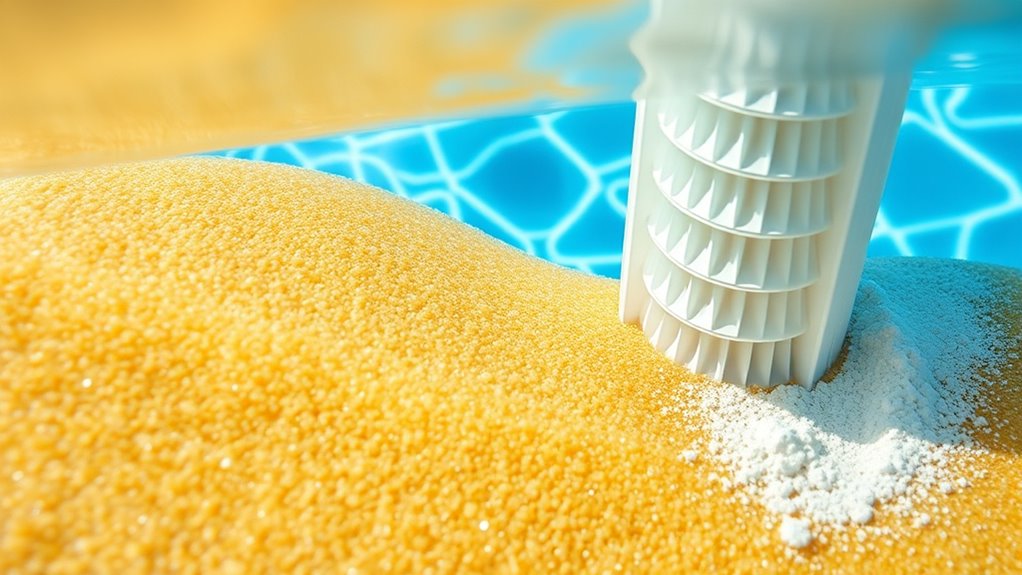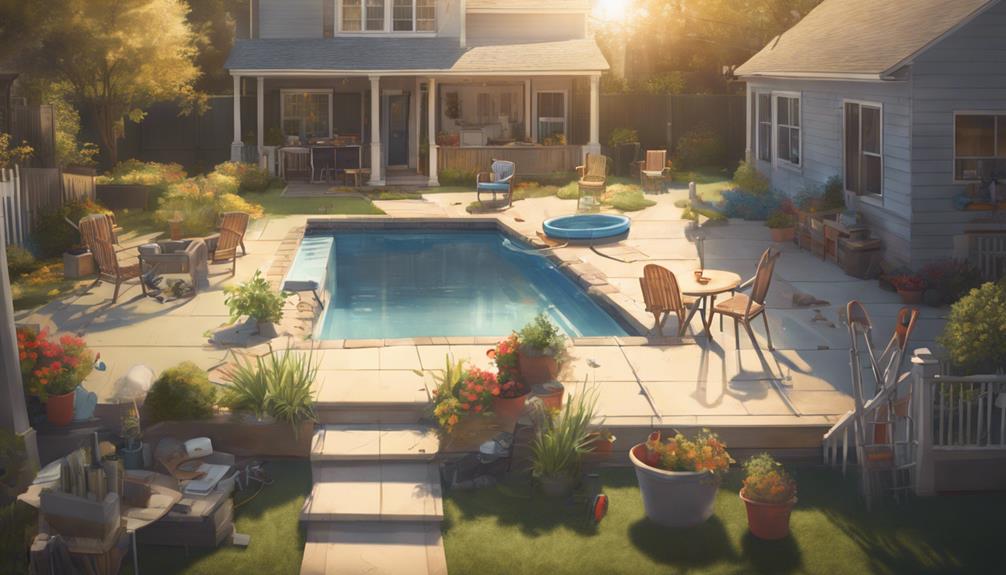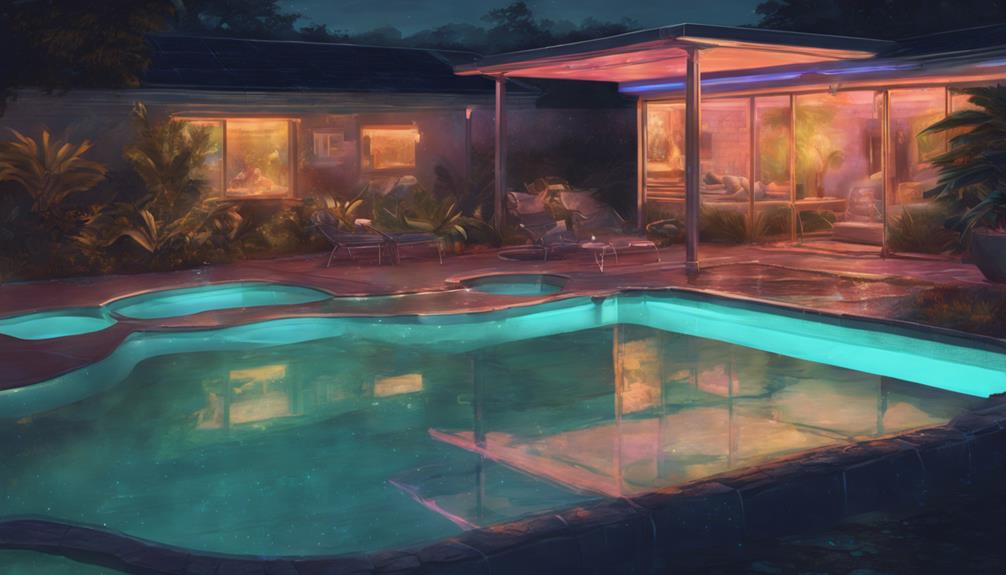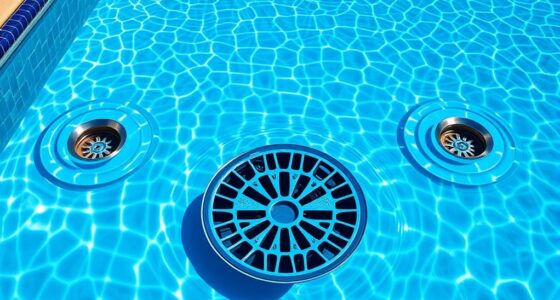Choosing the right pool filter depends on how clear you want your water, your budget, and how much maintenance you’re willing to do. Sand filters are simple and low-cost but may trap fewer tiny particles. Cartridge filters capture finer debris and are easier to clean, while DE filters provide the clearest water by trapping particles as small as 3 microns but require regular upkeep. If you’re curious about which system fits your needs best, you’ll find useful details ahead.
Key Takeaways
- Sand filters use graded sand to trap dirt and debris, requiring periodic backwashing for maintenance.
- Cartridge filters utilize replaceable cartridges that capture smaller particles, with less backwashing needed.
- DE filters coat grids with fine diatomaceous earth, offering superior filtration down to 3 microns for crystal-clear water.
- Choice depends on pool size, water quality needs, budget, and preferred maintenance effort.
- Proper maintenance of each filter type is essential for optimal water clarity and pool health.
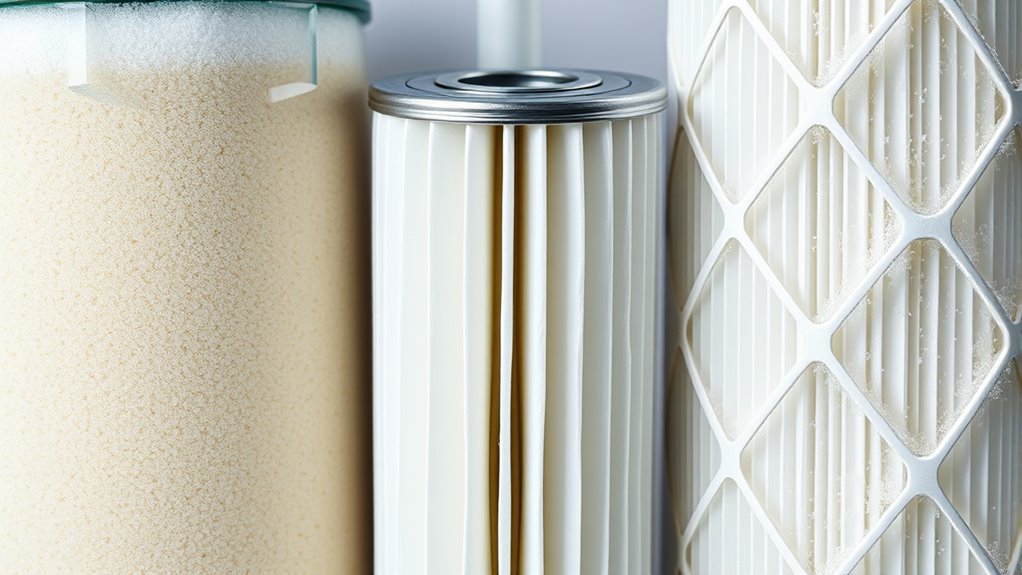
A well-maintained pool relies on an effective filtration system to keep the water clean and safe. When you’re focused on pool maintenance, understanding how different filters impact water chemistry and cleanliness is essential. The right choice can make a significant difference in how easy it is to keep your pool sparkling and healthy.
Sand filters are a popular option because they’re simple and cost-effective. They work by passing water through a bed of specially graded sand, which traps dirt, debris, and some bacteria. As water flows through, the sand captures particles, then you backwash the system to flush out the collected debris. Sand filters are low maintenance, but they do have limitations. They tend to trap larger particles more effectively than tiny contaminants, so if your pool sees a lot of debris or you want the clearest water possible, you might need to clean or replace the sand periodically.
Cartridge filters, on the other hand, are known for their superior filtration capabilities. They feature a replaceable cartridge that captures smaller particles than sand filters can handle. Because of this, they require less backwashing, which preserves water and reduces the need for frequent maintenance. When water chemistry changes or debris accumulates on the cartridge, you simply remove and rinse or replace it. Cartridge filters are ideal if you want clear water with minimal fuss, especially in pools with lots of fine particles or algae prone water. They’re more efficient at trapping dirt, but their filter cartridges need regular cleaning or replacement to maintain peak performance.
Diatomaceous earth (DE) filters combine the best of both worlds. They use a fine powder called DE to coat grids inside the filter, creating a highly effective barrier for tiny particles. DE filters can trap particles as small as 3 microns, resulting in the clearest water among the three options. They require more frequent maintenance, including adding fresh DE powder and cleaning the grids periodically. Because they filter so efficiently, DE filters are often favored by pool owners who prioritize water clarity and quality, especially in areas with lots of dust or pollen. Additionally, professional-grade filtration can significantly improve your pool’s overall water quality.
Choosing the right filtration system depends on your pool’s specific needs, your budget, and how much effort you want to put into routine maintenance. Each type influences water chemistry differently, as cleaner, well-filtered water helps maintain proper pH levels and prevents algae growth. Ultimately, understanding how these filters work allows you to select the best filtration system for your pool, ensuring it stays safe, inviting, and easy to maintain.
Frequently Asked Questions
How Often Should I Backwash My Sand Filter?
You should backwash your sand filter when the pressure gauge rises 8-10 psi above the normal operating level, typically every 8-12 weeks. Regular backwash frequency is key to proper filter maintenance, ensuring your pool stays clear and clean. Keep an eye on the pressure gauge, and don’t wait too long to backwash, as neglecting this step can reduce filtration efficiency and strain your pool’s equipment.
What Is the Lifespan of a Typical Cartridge Filter?
Your cartridge filter typically lasts about 1 to 3 years with proper filter maintenance, making it a reliable choice for clean water. The lifespan comparison shows that cartridges may need replacement sooner than sand filters but often last longer than DE filters if well-maintained. Regular cleaning and timely replacements help extend its life, ensuring your pool stays crystal clear while you enjoy more worry-free swimming moments.
How Do I Choose the Right Filter Type for My Pool?
To choose the right pool filter, consider your water chemistry and maintenance costs. If your water has high organic matter or debris, a sand filter might be better, but it requires backwashing and has higher maintenance costs. Cartridge filters are convenient, with easier maintenance, ideal for moderate debris. DE filters provide the clearest water but need more frequent cleaning and higher upkeep. Pick based on your water quality needs and how much maintenance you’re willing to do.
Are DE Filters More Energy-Efficient Than Sand or Cartridge?
DE filters are generally more energy-efficient than sand or cartridge filters because they provide superior filtration performance with less pressure, reducing the workload on your pump. This means your pump runs more smoothly and uses less energy over time. If you want better filtration and lower energy costs, a DE filter is a smart choice, especially if you’re aiming for ideal water clarity with less power consumption.
Can I Upgrade My Filter Without Replacing the Entire System?
Think of your pool system as a finely-tuned orchestra—you can often upgrade the filter as a soloist without replacing the entire ensemble. A filter upgrade is usually feasible if it’s compatible with your current system. Before making any moves, check system compatibility to ensure smooth operation. Many upgrades, like switching to a higher-efficiency DE or cartridge filter, can boost performance without the hassle of a full system replacement.
Conclusion
Choosing the right pool filter is like selecting the perfect lens for a clear view—each type offers unique clarity. Sand filters are like a gentle breeze, quietly sweeping away debris, while cartridge filters act like a sharp gaze, capturing even the tiniest particles. D.E. filters are the meticulous artist, providing the clearest picture. Ultimately, your choice shapes your pool’s sparkle, turning murky waters into a shimmering oasis—your personal paradise, just waiting to be enjoyed.

